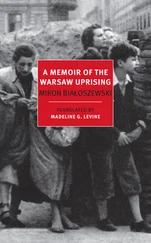Shortly after that, Adam began foraging with the other members of his gang for chestnuts, dandelion leaves and nettles in the bombed-out lots and abandoned fields throughout the ghetto, turning their afternoons into urban safaris. He usually spent the tiny allowance I gave him on the molasses gloop that passed for candy in our ramshackle Never-Never-Land, though he managed to come home once with half a chocolate cake, earned, he beamed, by teaching a new friend in the chorus to ride a bicycle.
Adam rehearsed with Rowy and the other singers two afternoons a week. Just before Christmas, he also started taking chess lessons from Ziv in the young man’s room at the bakery.
The weather had turned bitter cold by then, and it became common to see shivering beggars and even stone-frozen corpses on the street. The German guards must have hated being so far from home throughout the winter, and they started beating Jews at random to keep themselves entertained. In consequence, Adam’s extensive wanderings left Stefa in a state of nervous exhaustion. She scolded him often, but he’d simply disappear with Wolfi, Feivel, Sarah and his other friends whenever we left him on his own. By this time, he and his playmates had demonstrated that they were able to avoid the Gestapo and the Jewish police far better than any adult, so after a while Stefa and I stopped worrying ourselves sick.
Still, I began to suspect that he and his friends might be up to no good – maybe even smuggling – when Adam came home late one afternoon smelling like manure.
‘Wolfi pushed me into a rubbish heap!’ he told me.
By then I’d heard of kids crawling through sewage tunnels to reach Christian territory and offered him a sceptical look.
‘It’s true!’ he insisted. ‘You know Wolfi is meshugene ! And he’s getting worse!’
‘All right, I believe you,’ I told him, since Wolfi was indeed a handful. I took him by the hand. ‘Anyway, let’s get you clean before your mother comes home or we’ll have no peace tonight.’
Mail was still being delivered, though we had to pay weekly bribes to the postman, and a first letter from Liesel reached me in early January. The photograph she sent showed off what she called her ‘Mediterranean tan’. Her new friend Petrina had short needles of black hair and watery eyes. Her arm was draped over my daughter’s shoulder in a comradely manner, but I could see from the solemn way Liesel looked at her that she had fallen in love.
Liesel had posed that way to tell me what she didn’t dare write.
My daughter asked what we needed, so I scribbled a long list beginning with pipe tobacco for me, pepper for Adam and bitter chocolate for Stefa.
Keeping secrets between us seemed pointless now. ‘May you and Petrina enjoy a happy life together in the land of Homer,’ I ended my letter. ‘Inside this envelope is a kiss from your silly old father, who hopes you forgive him.’
For years, I had feared giving up my expectations for my daughter, but when I posted that letter I felt a lightness of spirit that left me giddy – as if I’d repaired what had been broken. When I later told Izzy about what I’d written to Liesel, he congratulated me – which I knew he would – and I surprised myself by confessing to him that I was only now becoming the father I’d always hoped to be.
That evening, after supper, my nephew and I went for a long happy walk. Our last.
Know this: Adam was a child born under the signs of both the sun and moon. When he was sad, his unhappiness swept over Stefa and me like a desolate wind, turning our spirits to dust. But when he was happy – dancing by himself to a tango on the Victrola, or stretching his little fingers across Bach arpeggios on his mother’s piano, or just sitting at my feet multiplying numbers – we were certain we would be able to outlast the Nazis.
Adam carried Gloria home inside a shoebox during the third week of January of 1941, and the lesson I wish she hadn’t taught us was that even fairy-light creatures can tilt the balance of several lives.
On lifting the lid off his box, my nephew told his mother and me that the manager of the Roth’s Pet Shop had given him the budgerigar free of charge. As to the reason, all the boy had to do was point; Gloria’s left foot was a lumpy grey mass hanging by a thread – a textbook illustration of the ravages of cancer.
‘God in heaven,’ lamented Stefa as she stared at the poor creature, ‘what the hell are we going to do with a crippled budgie?’
Gloria limped into the far corner of the box, gamely trying to put some distance between herself and my niece. The bird was pale blue, with a bright yellow beak and slender black and white wings. She’d have been pretty, but her breast was gouged with raw-looking empty patches.
‘She can’t fly,’ Adam informed us glumly. ‘One of her wings doesn’t work. So I’ve adopted her.’
‘She’s going to leave droppings everywhere!’ Stefa declared, her hands on her hips.
‘She can’t leave anything if we don’t feed her,’ I joked.
The boy glared as if I was a traitor, then stuck out his tongue at me.
I stuck out my tongue back, then tried to pinch his ear, but he ducked away.
‘Adam, my darling,’ Stefa snapped, and her darling was a clue that he’d better run for cover, ‘this poor bird is undoubtedly crawling with lice and is going to spread disease, and I want you to get rid of it this minute and then scrub your hands!’
My niece had begun to rely on run-on sentences to outduel her son. Hoping to broker a truce, I said, ‘I’ll build her a cage.’
‘Oh, like you built those lopsided bookcases of yours!’ Stefa observed, pointing to my rickety constructions. She showed me that sneer of hers that was like a boot on your chest.
‘We’ll buy a cage,’ Adam interjected, and the little imp produced two złoty from his pocket with a cheeky smile.
‘Where’d you get those?’ his mother demanded, certain he’d become a criminal.
‘Gambling on horses!’ he shouted. His true wish, perhaps.
‘How really?’ I asked.
‘I do maths homework for Feivel, Wolfi and some of the other kids.’
A few days later, Gloria moved into a conical cage that Izzy made for us out of a wood base and wire spokes. He soldered a swastika to the finial, since provoking Stefa was the key to the vaudeville routine they’d developed over the years.
‘Izzy, that’s not funny at all!’ she told him, which made him grin in triumph.
‘What you don’t understand, Stefa my sweetheart,’ he told her, ‘is that madness and magic are inseparable. The swastika will prevent the Nazis from confiscating Gloria when they pass a law against Jewish pets.’
By then, Adam was in love. Gloria’s repertoire was limited to eating, chirping, defecating and tearing out her breast feathers in a neurotic frenzy, but my nephew would put her on his shoulder and carry her around as if she were the bewitched form of a princess. When Stefa wasn’t home, he’d even sit her on his head. Gloria seemed to enjoy riding on a bouncy perch made of blond hair and smelling of our last bar of lavender soap, but does anyone know what a budgie is really thinking in between meal times?
For Adam, joy had feathers. And after a while, I realized there was something affecting and encouraging about Gloria – maybe because her total, irremediable uselessness was proof that we could still afford at least one luxury.
Adam’s chorus gave its first concert on 28 January, at Weisman’s dancing school on Pańska Street. A water pipe had burst that morning, and despite some frantic mopping by the organizers, puddles were still scattered around the room.
In the audience were a few friends and acquaintances, including the renowned jazz pianist Noel Anbaum, and Ewa, whom Stefa – ever the matchmaker – had hooked up with Rowy after sizing up the young man at a chorus rehearsal. According to my niece, the two had already had three extremely successful dates, and the knowing look she gave me as she pronounced her assessment made it clear just how far they’d already journeyed together.
Читать дальше












